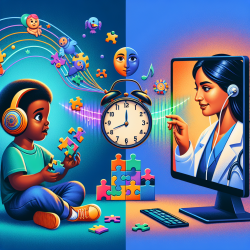Introduction
Autism Spectrum Disorder (ASD) is a complex neurodevelopmental condition that affects social communication and behavior. According to a systematic review titled The Correlation Between Autistic Childhood Disorders and the Development of Anxiety and Depression in Adults, there is a significant link between autism in childhood and the development of anxiety and depression in adulthood. This blog aims to provide practitioners with insights from the study to improve therapeutic outcomes for children with ASD.
Key Findings from the Research
The systematic review analyzed data from multiple studies and found that children with autism are more likely to develop anxiety and depression as they transition into adulthood. The research highlights several key points:
- Children with ASD exhibit higher levels of anxiety and depression compared to their peers without autism.
- Early behavioral interventions can significantly reduce the likelihood of developing these mental health issues in later life.
- Socioeconomic factors, such as parental education and financial resources, play a role in the development of these conditions.
- Gender differences exist, with females showing increased anxiety and depression symptoms during adolescence compared to males.
Implementing Research Outcomes in Practice
For practitioners working with children with ASD, the research underscores the importance of early intervention. Here are some strategies to consider:
- Behavioral Therapy: Implement early intensive behavioral interventions to improve social skills and reduce anxiety and depression.
- Parental Involvement: Engage parents in therapy sessions to educate them about coping strategies and the importance of a supportive home environment.
- Monitoring and Assessment: Regularly assess children for signs of anxiety and depression to intervene promptly.
- Socioeconomic Support: Advocate for resources and support systems for families from lower socioeconomic backgrounds to ensure access to quality care.
Encouraging Further Research
While the review provides valuable insights, it also highlights the need for more research in this area. Practitioners are encouraged to contribute to the body of knowledge by engaging in research activities that explore the long-term impacts of ASD and effective interventions. By doing so, we can develop more targeted therapies and improve the quality of life for individuals with autism.
Conclusion
Understanding the correlation between autism and mental health issues in adulthood is crucial for developing effective interventions. By implementing early behavioral therapies and supporting families, practitioners can help mitigate the risks of anxiety and depression in children with ASD. For those interested in delving deeper into the research, the original study can be accessed here: The Correlation Between Autistic Childhood Disorders and the Development of Anxiety and Depression in Adults: A Systematic Review.










